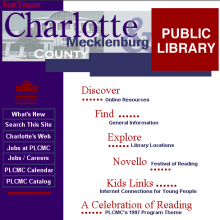You are here
Library web site goes live
This is a 1997 capture of the Charlotte Mecklenburg Library’s first website by the Wayback Machine of the Internet Archive.
- On the left in red on blue is the old PLCMC logo, showing the dome of the 1989 Main Library.
- Below the logo is a link to “Charlotte’s Web.” Later in 1997, it would become independent of the Library. It ceased operations in the year 2000.
- Note that the links in the center promise to help users find “Online Resources” and “Internet Connections for Young People.” They reflect the application to the Internet of traditional librarianship – selecting and cataloging materials and guiding patrons to them. The next year, Google would be founded.
Following the creation of its own website, the library began to rely on the internet for internal and external communications. A staff-only “Intranet” debuted in January of 1998 to keep employees informed and to develop their skills in electronic information retrieval.
In November of 1997 the library began “Readers Club,” a website that extended the traditional librarian's function of readers advisory to the internet. It offered book reviews by library staff and members of the public. It created a space for user-generated content that promoted the library’s collection. The staff volunteers on the Readers Club team edited reviews to keep them within 125 words and to include only those in which the reviewer recommended the book. In time, Readers Club included celebrity reviewers and author interviews. It garnered blurbs of praise from authors, including two former Presidents of the United States. The next year the library added a similar site, Bookhive, that covered children’s literature. Both were featured in an article on “The Future of the Library.” (Balas, 1999)Janet L. Balas, “A Librarian’s work will never be done,” Computers in Libraries 19.10 (Nov/Dec 1999) pp,46-50. The two were included under the heading, “Great Reader’s Advisory Services Found on the Web.”
Detailed Citations:
Balas, Janet L. “A Librarian’s work will never be done.” Computers in Libraries 19.10 (Nov/Dec 1999) pp,46-50.
